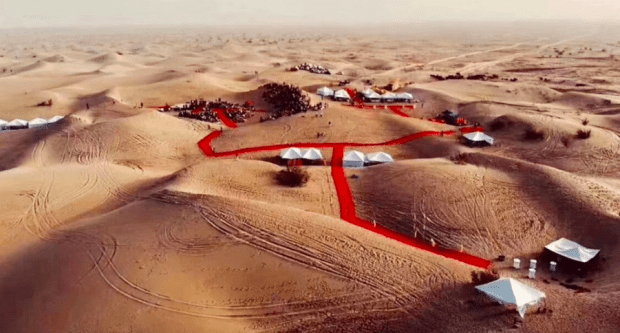What’s Mandarin For ‘Arbeit Macht Frei’?

Muslim inmates from internment camps in far western China hunched over sewing machines, in row after row. They were among hundreds of thousands who had been detained and spent month after month renouncing their religious convictions. Now the government was showing them on television as models of repentance, earning good pay — and political salvation — as factory workers.
China’s ruling Communist Party has said in a surge of upbeat propaganda that a sprawling network of camps in the Xinjiang region is providing job training and putting detainees on production lines for their own good, offering an escape from poverty, backwardness and the temptations of radical Islam.
But mounting evidence suggests a system of forced labor is emerging from the camps, a development likely to intensify international condemnation of China’s drastic efforts to control and indoctrinate a Muslim ethnic minority population of more than 12 million in Xinjiang.
Accounts from the region, satellite images and previously unreported official documents indicate that growing numbers of detainees are being sent to new factories, built inside or near the camps, where inmates have little choice but to accept jobs and follow orders.
Slave labor, in other words, though they are paid a little bit. Still, if you have no choice but to do the work, you are a slave.
Now, Chinese commie-capitalism has jumped in to take advantage of the enslaved Muslims:
The documents detail plans for inmates, even those formally released from the camps, to take jobs at factories that work closely with the camps to continue to monitor and control them. The socks, suits, skirts and other goods made by these laborers would be sold in Chinese stores and could trickle into overseas markets.
Kashgar, an ancient, predominantly Uighur area of southern Xinjiang that is a focus of the program, reported that in 2018 alone it aimed to send 100,000 inmates who had been through the “vocational training centers” to work in factories, according to a plan issued in August.
That figure may be an ambitious political goal rather than a realistic target. But it suggests how many Uighurs and other Muslim ethnic minorities may be held in the camps and sent to factories. Scholars have estimated that as many as one million people have been detained. The Chinese government has not issued or confirmed any figures.
“I don’t see China yielding an inch on Xinjiang,” said John Kamm, the founder of the Dui Hua Foundation, a San Francisco-based group that lobbies China on human rights issues. “Now it seems we have entrepreneurs coming in and taking advantage of the situation.”
China has also been cracking down very hard on Christianity lately, the Times reports:
The government seems to be handling Christianity in two different ways.
It has pursued diplomacy toward Roman Catholics, forging a deal with the Vatican that would have Rome recognize government-appointed bishops in exchange for the Vatican gaining some say in how they are appointed.
This, in theory, would bind all Catholics to the government-run church and make underground churches unnecessary.
Protestantism, which lacks a centralized structure, has had several important churches closed or destroyed, apparently as a warning.
Seems to me that if Christianity survives in China, it will be Protestant Christianity, because after Pope Francis’s deal with Beijing, described by Hong Kong’s Cardinal Zen as a “complete surrender,” Catholicism may come to be seen as collaborationist. We will see.
Back to the slave laborers of Xinjiang province. The American management consulting firm McKinsey is a collaborator with the Chinese government, according to a different story in the Times, and recently had a number of its employees visit brutalized Xinjiang province — for fun. This will fire up your inner anti-capitalist:
This year’s McKinsey & Company retreat in China was one to remember.
Hundreds of the company’s consultants frolicked in the desert, riding camels over sand dunes and mingling in tents linked by red carpets. Meetings took place in a cavernous banquet hall that resembled a sultan’s ornate court, with a sign overhead to capture the mood.
“I can’t keep calm, I work at McKinsey & Company,” it said.
Especially remarkable was the location: Kashgar, the ancient Silk Road city in China’s far west that is experiencing a major humanitarian crisis.
About four miles from where the McKinsey consultants discussed their work, which includes advising some of China’s most important state-owned companies, a sprawling internment camp had sprung up to hold thousands of ethnic Uighurs — part of a vast archipelago of indoctrination camps where the Chinese government has locked up as many as one million people.
A McKinsey spokesman told the Times that the company will not accept jobs at odds with its values. That being the case, then the company’s values are pretty clear. I would like to ask one of the Uighurs forced to renounce his religion, and then relegated to slave labor, what he thinks of McKinsey’s values. But hey, McKinsey believes in “inclusion and diversity.”
Guess you can collaborate with a police state to help them do their jobs better, but as long as you celebrate inclusion and diversity, you’re in the clear.

UPDATE: Here’s a genuinely interesting perspective from a reader who has lived in China for the past decade, taken from the reader’s comment in the thread. Don’t misread me: I’m not agreeing with this comment, but only saying that it’s interesting:
I can say, however, that the Chinese understand very clearly that Europe has made a mess of itself by not nipping the problem of Islamic extremism in the bud, and they don’t want the same trouble for themselves. Chinese cities are largely peaceful, if not quite orderly by Western standards. But there have been problems of knife attacks by random Xinjiang separatists in various cities during the entire time I’ve been here. I’m sure they don’t want the problem to escalate to what has become the new normal in European cities. So you can criticize their methods, but you have to understand their motivation.
Another thing to understand is that the vast majority of Chinese people like the Chinese government, for the simple reason that it doesn’t bother them and they’ve seen their lot in life improve over the last thirty years. There is a strong tendency among Westerners who have never been to China and know nothing about it to assume that “Red China” is like Stalinist Russia, with every neck under a boot heel. It’s not. Yes, if you’re on the wrong side of the government – a Xinjiang separatist, a Tibetan activist, a Falun Gong, etc. – they will make your life hell. But out of 1.4 billion people, most Chinese are not any of those things, and the only thing they know is that China used to be poor and now it’s rich.
The would-be Chinese empire is an illiberal counterpart to the liberal American empire. As such, they actually show elements of conservatism in comparison to America, despite being nominally communist and hence supposedly further to the left. For example, the attack on the nuclear family in America would never fly in China. People here generally have an instinct that getting married and having kids is the purpose of human life and is inherently good (despite the abhorrent widespread practice of abortion). That’s why they’ve had to clamp down on population growth, in contrast to every Western nation which has below replacement fertility levels.
Subscribe for as little as $5/mo to start commenting on Rod’s blog.